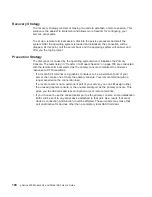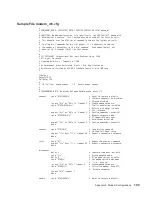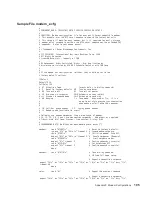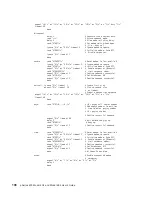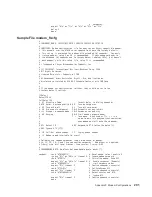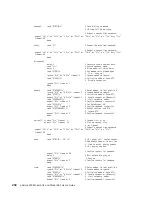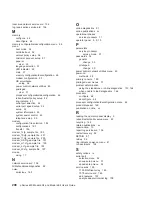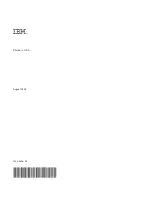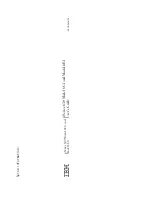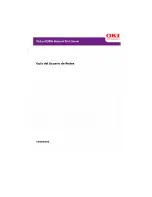
# responses.
expect "8\r" or "7\r" or "6\r" or "4\r" or "3\r"
delay 2
done
Sample File modem_f0.cfg
#
# COMPONENT_NAME: (ESPSETUP) ENTRY SERVICE PROCESSOR SETUP F0
#
# FUNCTIONS: Modem configuration file for many recent Hayes* compatible modems.
# This example uses the AT&F0 reset command to choose the factory defaults.
# This set up is preferred for modems with extended (&) commands. For early
# vintage modems, setup Z or Z0 is recommended. If your modem responds to
# the extended (&) commands and to factory default choices (&Fn), but doesn’t
# work properly with this setup file, setup F1 is recommended.
#
# * Trademark of Hayes Microcomputer Products, Inc.
#
# (C) COPYRIGHT International Business Machines Corp. 1996
# All Rights Reserved
# Licensed Materials - Property of IBM
#
# US Government Users Restricted Rights - Use, duplication or
# disclosure restricted by GSA ADP Schedule Contract with IBM Corp.
#
#
# If the modem has configuration switches, they should be set to the
# factory default settings.
ICDelay 1
DefaultTO 10
CallDelay 120
# AT Attention Code
,
Inserts delay in dialing commands
# &F0 Reset. Restore profile 0 Q0
Turn on responses
# E0 Turn echo off
Q1
Turn off responses
# V0 Use numeric responses
S0=0 Automatic answer inhibit
# +++ Escape to command mode
S0=2 Answer on second ring
# H0 Hang-up
X0=0 Limit modem response codes
#
T = Tone mode. When used as T\r, it is a
#
no op to maintain program synchronization
#
when modem may/will echo the commands.
#
# &C1 Detect CD
&D2 Respond to DTR (often the default)
# &R1 Ignore RTS (CTS)
#
# %N Call-Out phone number
%P
Paging phone number
# %S Modem speed (available to users)
#
# Following are common responses from a wide range of modems:
# 16, 15, 12, 10, 5 and 1 are connection responses. Add others as required.
# 7=busy; 6=no dial tone; 4=error; 3=no carrier; 2=ring; 0=OK
#
# PROGRAMMING NOTE: No blanks between double quote marks (").
condout:
send "AT&F0Q0T\r"
# Reset modem. Select profile 0
ignore "0\r" or "OK\r\n" timeout 2 # Ignore modem response.
send "ATE0T\r"
# Initialize modem: Echo OFF,
expect "0\r" or "OK\r\n" timeout 2 # Enable responses (Numeric),
send "ATQ0V0X0T\r"
# Limit response codes.
expect "0\r" timeout 2
# Confirm commands successful.
send "ATS0=0\r"
# Set AutoAnswer OFF
expect "0\r" timeout 2
# Confirm command successful.
send "AT&C1&D2&R1\r"
# Detect carrier and DTR,
# Ignore RTS.
expect "0\r" timeout 2
# Confirm command successful.
done
Appendix F. Modem Configurations
201
Summary of Contents for 6.00E+04
Page 1: ...pSeries 630 Model 6C4 and Model 6E4 User s Guide SA38 0606 00 ERserver IBM...
Page 2: ......
Page 3: ...pSeries 630 Model 6C4 and Model 6E4 User s Guide SA38 0606 00 ERserver IBM...
Page 14: ...xii pSeries 630 Model 6C4 and Model 6E4 User s Guide...
Page 16: ...xiv pSeries 630 Model 6C4 and Model 6E4 User s Guide...
Page 44: ...26 pSeries 630 Model 6C4 and Model 6E4 User s Guide...
Page 92: ...74 pSeries 630 Model 6C4 and Model 6E4 User s Guide...
Page 108: ...90 pSeries 630 Model 6C4 and Model 6E4 User s Guide...
Page 122: ...104 pSeries 630 Model 6C4 and Model 6E4 User s Guide...
Page 168: ...150 pSeries 630 Model 6C4 and Model 6E4 User s Guide...
Page 174: ...156 pSeries 630 Model 6C4 and Model 6E4 User s Guide...
Page 190: ...172 pSeries 630 Model 6C4 and Model 6E4 User s Guide...
Page 200: ...182 pSeries 630 Model 6C4 and Model 6E4 User s Guide...
Page 224: ...206 pSeries 630 Model 6C4 and Model 6E4 User s Guide...
Page 231: ......
Page 232: ...IBMR Printed in U S A August 2002 SA38 0606 00...




